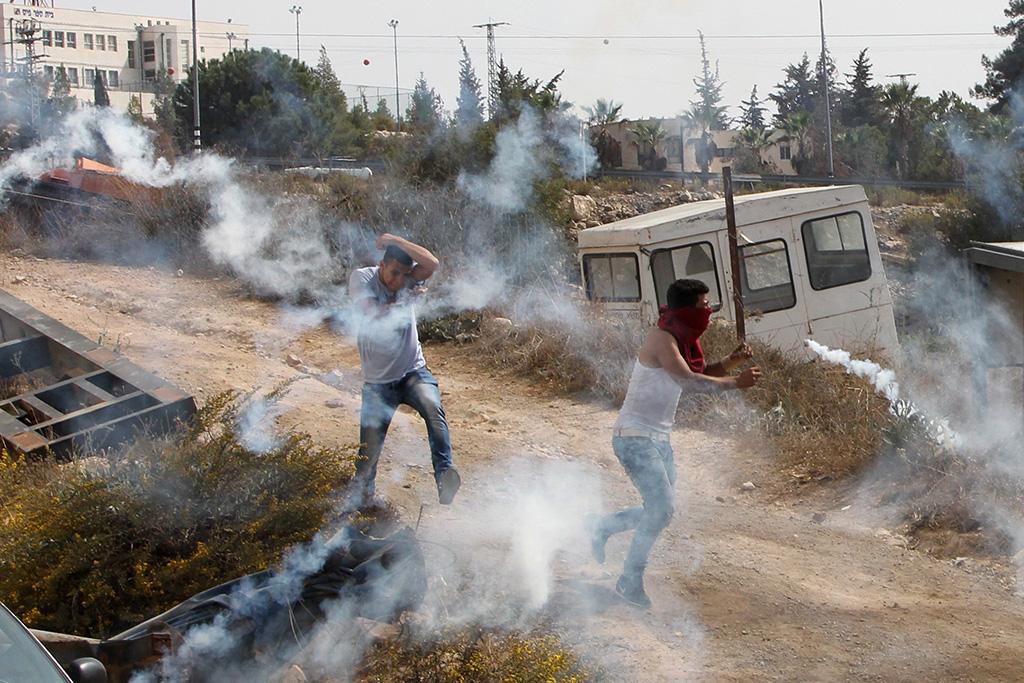4 Israeli cities effectively ban Arab workers from their schools
Palestinian students from Palestine Polytechnic University react as tear gas canisters are fired by Israeli security forces during clashes following a protest against Israel near the Jewish settlement of Beit Hagai, at the southern entrance to the occupied West Bank city of Hebron, Oct. 18,2015.
Editor's note: This is Chatter, our morning rundown of what you need and want to know around the world. Fortunately for us all, you can have Chatter emailed to you every day. Just sign up here!
Need to know:
The violence in Israel and Palestinian territories shows no signs of abating. If anything there are signs of the opposite — tensions are becoming even more deeply entrenched, if that is possible.
On Sunday, four Israeli cities essentially banned Arab laborers from their schools. To be fair, they didn't use the word "Arab." The cities of Tel Aviv, Rehovot and Hod Hasharon, citing security concerns, announced that maintenance workers and cleaners — many of whom are Arabs — would not be allowed into schools.
Another city, Modiin-Maccabim-Reut, midway between Tel Aviv and Jerusalem, said "minority members" — a term Jews in Israel often use for Arab citizens who make up 20 percent of the population of 8 million — would be banned from working in its schools.
As the violence enters its second month, Israel is literally building concrete walls between Jewish and Palestinian neighborhoods. They have upped security in unprecedented fashion. Meanwhile, Palestinians cite the Israeli occupation and thwarted dreams of independence as continuing cause for discontent. Very little room in this scenario for bettering ties. Which is scary.
At first, it was tensions at the al-Aqsa mosque compound in Jerusalem, which is revered by Jews and Muslims alike, that reignited violence. But now, it's hard to say what causes any one act of violence, as the cycle self-perpetuates. Forty-one Palestinians and seven Israelis have died so far.
Whether it's intifada bad is up for debate. Many in Jerusalem are already in that frame of mind. Others draw very clear distinctions between the violence that's happening now, which is mainly being perpetrated by people too young to have clear recollections of the Second Intifada or the crackdown that followed.
Unlike in earlier uprisings, the attackers this time around usually don't have criminal records and aren't affiliated with a political faction. They are "lone wolf" attackers, reports GlobalPost's Laura Dean from Jerusalem.
Want to know:
What does the Arctic have in common with Syria and Ukraine? Well, it's big. It boasts many resources. And Russia's all about it!
Moscow aims to open 10 new airbases in the Arctic region by the end of this year in addition to four that are already operational. Last December, Russia set up a new Arctic strategic command and began revamping Cold War-era naval, army and air defense installations across its vast northern region.
Why? For starters the Arctic is apparently warming faster than any other place on Earth. The obvious and terrifying ramifications for the human race aside, what the melting of the ice caps is also doing is freeing up natural resources. The Arctic has an estimated 22 percent of the world’s undiscovered oil and natural gas reserves. It also has rare earth metals and other valuable minerals. In other words, it's a gold mine. And Putin likes gold.
GlobalPost's Paul Ames reports on Russia's part in the polar land grab that is currently underway and which many fear could turn into an Arctic arms race.
Strange but true:
Some people say a PhD isn't worth what it used to be. Maybe you are one of those people. It's OK, just don't tell Hun Sen, prime minister of Cambodia, who as of this week had obtained at least 13 doctorates.
This latest one came from China’s Guangxi University for Nationalities, and was reportedly in literature to honor his achievements as a leader.
Chief among those achievements is having been a member of the Khmer Rouge — which is responsible for having killed around 2 million people between the years of 1975 and 1979 — and having seized power from his then co-prime minister, Prince Ranariddh, in 1997, and refusing to relinquish it ever since.
While it is unclear exactly what Hun Sen was honored for, we posit that it was his ability to answer the riddle, "How many doctorates does it take to become one of the world's longest serving prime ministers?" with a simple gesture toward his drawing room wall.
The story you just read is available for free because thousands of listeners and readers like you generously support our nonprofit newsroom. Every day, reporters and producers at The World are hard at work bringing you human-centered news from across the globe. But we can’t do it without you: We need your support to ensure we can continue this work for another year.
Make a gift today, and you’ll get us one step closer to our goal of raising $25,000 by June 14. We need your help now more than ever!
